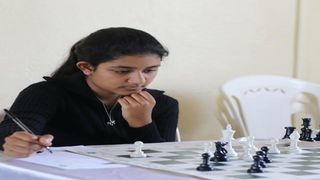
Naiya Gorsani in a previous chess competition. She is the only Kenyan who has qualified for the inaugural Online World Cadets and Youth Rapid Chess Championship.
| PoolOther Sports
Premium
2020 Year in Review: Chess Kenya play online gambit to checkmate virus restrictions
What you need to know:
- 44th World Chess Olympian and inaugural Olympiad for People with Disability were postponed
- Number of players registering for virtual games grows five fold as tournaments continue to run , both local and international, in a difficult year for sports
Thanks to technology, 2020 was a very busy year for local players despite the Covid-19 pandemic that practically saw most sports activities suspended for a while.
The government categorised chess as among the high-risk sports meaning players cannot traditionally meet physically to square it out on the board.
But local players have been busy battling it out in the mind game via virtual tournaments.
On December 12, more than 50 Kenyan chess players faced-off with their Ugandan counterparts in the second edition of the East Africa Youth Online Chess Championships.
Kenya’s Naiya Gorsani and Joe Mutua won all their matches to emerge top in the Under-16 girls and boys category respectively in the competition.
Chess Kenya president Bernard Wanjala observed that when the government in March suspended all sporting activities in the country due to the outbreak of Covid-19, he never imagined local players shining in major online events.

Chess Kenya Chairman Bernard Wanjala (left) receives Russia Deputy Prime Minister on arrival at Kisumu International Airport on Friday 17, August 2018.
“It is something I did not expect because only a small clique of players were conversant with online chess. It has shown that when people are left with no option, they embrace whatever is available,” said Wanjala, who doubles-up as the captain of Equity Bank Chess Club.
Globally, virtual matches have been happening daily since the International Chess Federation (Fide) suspended in-person competitions due to the pandemic, which led to the postponement of the 44th World Chess Olympiad and the inaugural Olympiad for People with Disability to 2021 in Russia.
Online contests
The online contests have been made possible by various websites, which include; lichess.org, chess.com and Internet Chess Club.

Equity Bank Chess Club Captain Benard Wanjala poses for a photo with the 2017 Kenya Premier Chess League trophy.
In Kenya, Prox Chess House and Black Knight Chess Club are some of the organisations that have been at the forefront in organising local online chess matches, in partnership with the federation.
They say that they prefer using Lichess website to chess.com and Internet Chess Club since it is free of charge.
Prox Chess House Chief Executive Officer Titus Kirega said that while they introduced online chess matches in 2017, it is after the government’s ban on in-person sporting activities in the country that more local players started playing online.
“Things have changed. We can now have up to 200 players competing in just one tournament. Before, foreign players were the ones who dominated tournaments, but now, we have many local players taking part," said Kirega.

Sadam Ali, the reigning Kenya National Chess Champion for People Living with Disability, ponders his next move in a past chess competition.
According to Anthony Kionga, the chairman of Black Knight Chess Club, since July, they have been holding three online tournaments weekly, and at no time have they cancelled any due to lack of participants.
“At the beginning, we would register only 20 players at most for the events. Nowadays, we register over 100 players for our online tournaments, an indication that the chess community has adopted online chess to keep its activities going,” he said.
But just like in other countries, Kenya too has not been spared of cheating, which is rampant in online chess.
Kionga and Kirega said that they have each banned two players from participating in their tournaments for cheating, a figure which is way lower compared to reports by some of the websites.
The Guardian reported on October 16 that chess.com had closed more than 85,000 accounts for cheating since March.

Peter Gilruth of Equity Bank Chess Club pondering about his next move during a past Kenya Premier Chess League.
Apart from assistance from a second party, cheating in online chess is made possible through the use of a separate computer or phone with a chess engine.
To help curb the menace, players are sometimes required to set their camera on during the matches, and also not leave their desk until the contest is over.
There are also apps used to detect cheating.
Despite the cheating menace, Wanjala said embracing the virtual tournaments immediately Covid-19 brought in-person competitions was the best thing local players did. This is because they continue to take part in several global contests.
“The virtual matches have kept us afloat. It is cheaper to participate in global tournaments, which in normal circumstances would have consumed a lot of resources,” he said.
Sadam Ali was the first to represent Kenya in a global virtual contest, when he competed in the Online Chess Cup for People with Disability in March.
Ali, who is the reigning champion of Kenya National Chess Championship for People with Disability emerged 26th in the invitational five-round tournament that featured 36 players from around the globe.
Poland’s Marcin Tazbir won the competition.
The second major tournament for Kenyan players was the inaugural online chess held in August to help keep active teams that were supposed to compete in the delayed 44th World Chess Olympiad in Russia.
The Peter Long-coached team did not make it past the group stage, as they finished sixth on eight points in Division Four.
India and Russia were declared joint winners of the competition after two Indian players lost their internet connection during the final round.

Woman Fide Master (WFM) Krishi Shah in action at Clarion Hotel in Nairobi on July 31, 2020 during day one of Division Four matches of the ongoing Online Chess Olympiad.
Kenya emerged top in Africa of the six nations that participated in the Online Chess Olympiad for People Living with Disability from November 21 to December 3.
The Kenyan team of four players, who included Ali, garnered 10 points, one more than Zimbabwe.
And on November 30, Gorsani was the only Kenyan who qualified for the Online World Cadets and Youth Rapid Chess Championships, which will be held from December 19 to 23.
The 15-year-old, who is rated 1331, qualified for the global contest by finishing third out of 15 contestants in the Under-16 category of the Africa qualifiers that ended on November 30.




